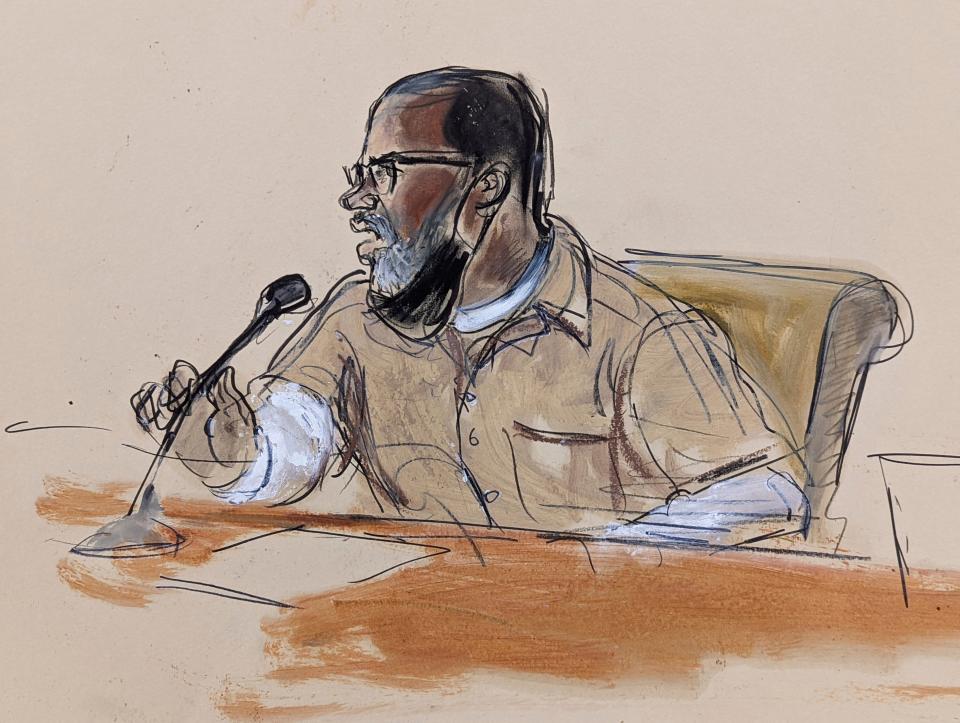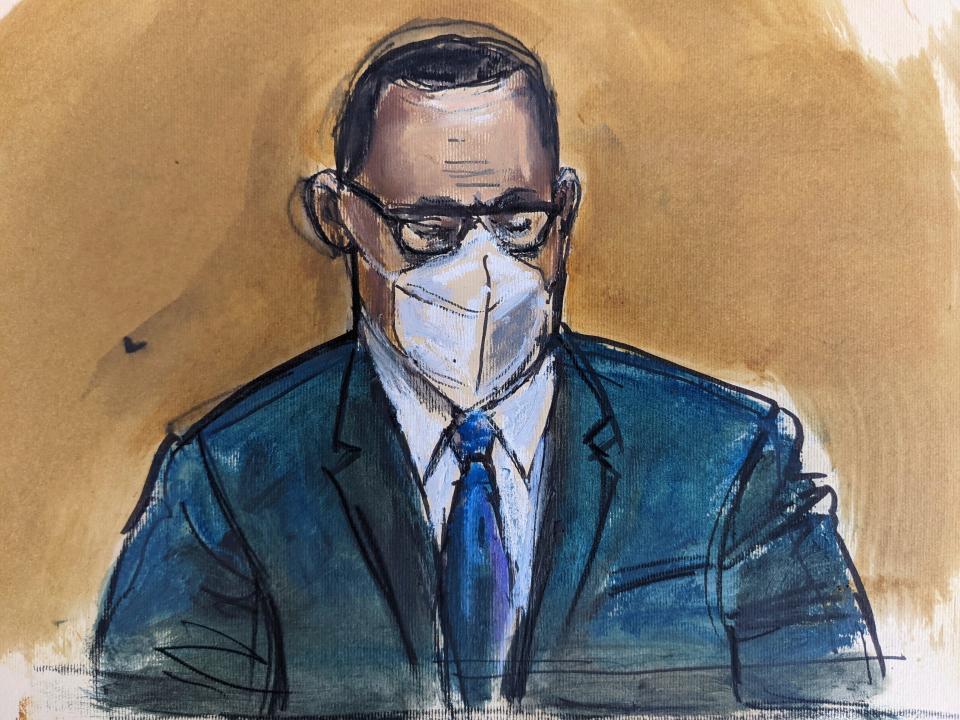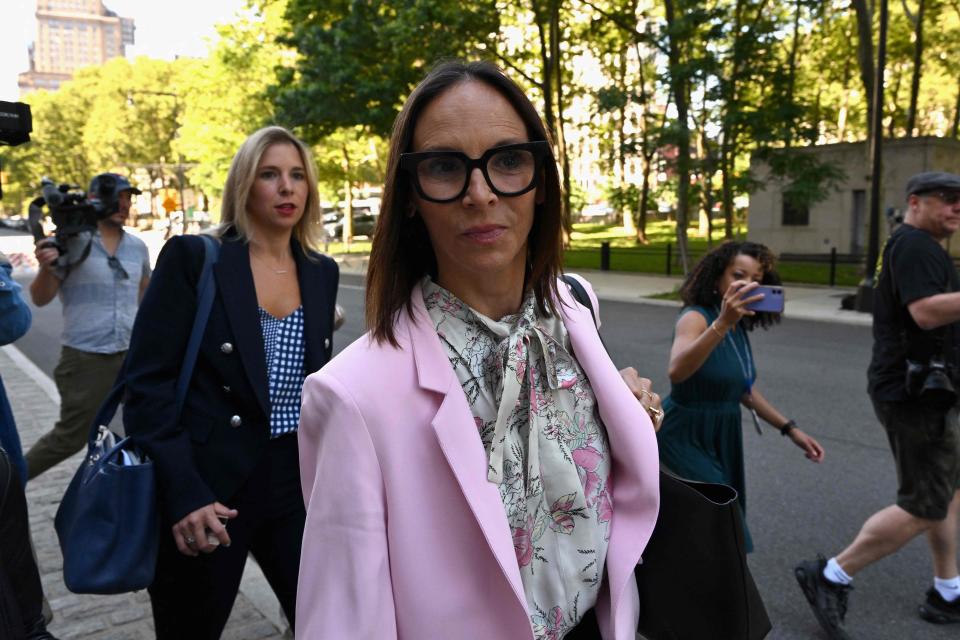R. Kelly's trial in Chicago, explained: Why the convicted sex offender is back in court
R&B star and convicted sex offender R. Kelly is due to face another federal jury trial this week as platoons of prosecutors and lawyers gird for a second attempt to convict him again as a sexual predator.
Kelly's next trial is due to start Monday in his hometown of Chicago, 11 months after he was convicted in a first federal trial in New York, and seven weeks after he was sentenced to 30 years in prison on racketeering and sex trafficking charges.
Why is R. Kelly going on trial again?
The short answer is that he's been charged with similar crimes in separate cases in two federal courts and in two state courts. This is the second federal court case, which was filed against him in July 2019 – on the same day charges were filed against him in New York federal court.
Federal prosecutors in different districts and in different states are independent of one another. If they decide to pursue the same defendant in separate cases, they can. Federal prosecutors don't have to explain themselves but their reasons can include that alleged high-profile crimes occurred in their jurisdiction and that crime victims in their jurisdiction want their day in court.
Charging decisions can be tricky to manage logistically, especially so during the COVID-19 pandemic, when federal courthouses were closed or under restrictions. Many hearings were conducted via video. For the trials, Kelly, who has been in jail since 2019, had to transported back and forth between Chicago and New York federal lockups.
What happened in the first trial?
Kelly's first trial was in the Eastern District of New York in Brooklyn in the summer of 2021. After six weeks of graphic testimony from dozens of accusers and witnesses, a jury deliberated two days before finding Kelly, 55, guilty on all nine counts of sex trafficking and racketeering. He was sentenced on June 29, 2022, and is now awaiting this second trial in the Metropolitan Correctional Center in Chicago, where he has spent most of his time since his arrest in 2019.
What is different about this second trial?
The court location is different. The judge is different: U.S. District Judge Harry Leinenweber. The federal prosecutors and the defense teams are different and more numerous.
Kelly's lead defense attorney is different (he has changed lawyers several times since 2019). She is Jennifer Bonjean, who last year persuaded the Pennsylvania Supreme Court to overturn Bill Cosby's 2018 sex-crimes conviction on constitutional grounds.

What are the charges R. Kelly is facing in Chicago?
The 13 charges, filed in 2019, include producing child pornography, enticing a minor to engage in criminal sexual activity, and conspiracy to obstruct justice.
And there are more defendants besides Kelly: His two co-defendants, Derrel McDavid and Milton "June" Brown, both former associates and employees, are alleged by prosecutors in the federal Northern District of Illinois to have aided him in the alleged crimes.
More: R. Kelly sentenced to 30 years in prison after NY sex trafficking conviction
More: R. Kelly's manager pleads guilty to stalking charge following phone threat conviction
At a pretrial hearing Aug. 3, Leinenweber said he expects the trial to last no more than about four weeks due to a shortage of courtroom space and staffing. He said the courthouse is still operating under COVID-19 restrictions requiring masks, distancing and twice-weekly testing.
What will be different about the jury in the Chicago trial?
The jury will be "confidential," meaning only the judge, lawyers and defendants will know the names and background of the jurors. In the New York trial, the jury was "anonymous," meaning no one knew anything about the jurors.
Assistant U.S. Attorney Elizabeth Pozolo said shielding information on jurors is necessary to protect them from being contacted by the media or the public for the purposes of influencing a verdict.
Bonjean and Beau Brindley, a lawyer for McDavid, argued against a "confidential" jury in Chicago, saying the government has presented no evidence to suggest the jury will be harassed during the trial.

"Every time you have a jury treated in that way, the jurors understand from the beginning that there is something they need to be worried about," Brindley said, thus possibly reducing the number of citizens willing to serve.
Leinenweber said the Kelly case has been so high-profile that "large groups of people feel strongly about it and are actively expressing their disagreement" with Kelly's prosecution, especially on social media.
"A confidential jury might help in this case, as long as we explain to (jurors) that we don't want to run the risk (the public or media) will contact them improperly," he said.
Has jury selection started?
A federal jury was impaneled Tuesday to decide the charges against Kelly, as prosecutors and defense attorneys argued toward the end of the process about whether the government was improperly attempting to keep some Black people off the jury.
As the sides began exercising peremptory challenges — in which they can remove a fixed number of potential jurors from the pool — Jennifer Bonjean accused prosecutors of seeking to strike Black people “to deny Mr. Kelly a jury of his peers.”
Prosecutors noted multiple African Americans had already made it onto the jury before the defense objected, and they argued their reasons for wanting to strike some had nothing to do with race.
Judge Leinenweber partially agreed with the defense, disallowing prosecutors from striking three Black people from the jury, and restoring them. About half the 12 jurors impaneled were identified as Black by the judge, prosecutor and defense attorneys.
Six alternates were also selected.
Will accusers and witnesses testify anonymously?
In the New York trial, some accusers testified anonymously, others under their real names or under pseudonyms. Their identities had been shielded in the indictments.
It is not yet clear what the rules will be for witnesses and accusers in the Chicago trial; these details are still being worked out.
More: R. Kelly removed from suicide watch in reversal by prosecutors after his attorney called it 'cruel'
More: R. Kelly accusers grateful for prison sentence
What differences will there be in expected testimony?
In general, the second trial is expected to revisit some of the same allegations that have followed Kelly around for decades as he rose to stardom, making him the target of critical media coverage and even a TV documentary series, "Surviving R. Kelly": That he's preyed on underage girls and women fans over decades and should be held accountable.
But the Chicago case will include a focus dating back 14 years. Kelly is charged with obstruction of justice because prosecutors allege Kelly and the others threatened and paid off witnesses before his 2008 trial in Chicago state court on a child pornography charge involving a sex tape and an alleged underage girl. Kelly was acquitted. Now, the government will attempt to convict him of fixing that trial.

During the pretrial hearing, Leinenweber ruled on more than a dozen motions from the lawyers about what evidence can and can't be admitted at the Chicago trial.
Kelly's lawyers sought a ruling to keep out testimony about Kelly's 1994 illicit marriage to the late singer Aaliyah when she was underage, a central issue in the New York trial. They also wanted to keep out testimony by Kelly accusers who claim they were impregnated by Kelly and that he arranged their abortions.
Leinenweber ruled these motions and others were moot because the government did not intend to introduce such testimony at this trial.
Will this be Kelly's final trial?
Maybe. Depending on what happens in this trial, it might not be the end of the prosecution of Kelly: Similar sex-crime charges have been pending against him since 2019 in Chicago's Cook County state court, and in Minneapolis' Hennepin County state court.
Both those cases were on hold during the federal prosecutions. Legal experts say it's likely they will not be revived if Kelly is convicted and receives another long sentence amounting to a lifetime in federal prison.
What are the rules for the media and the public attending the trial?
One aspect of the Chicago trial that will be similar to the New York trial: There will be no media or spectator cameras and devices allowed in the courtroom, where seating will be limited due to COVID. In the media overflow room, reporters covering the trial will be restricted to paper and pen only.
Contributing: Michael Tarm and Don Babwin, Associated Press
This article originally appeared on USA TODAY: R Kelly trial in Chicago: Why convicted sex offender is back in court

 Yahoo Movies
Yahoo Movies 